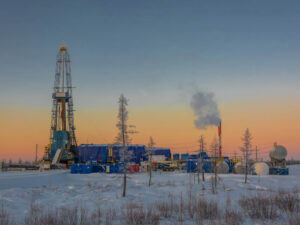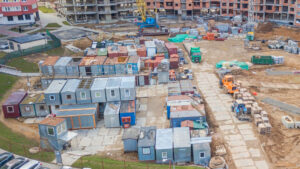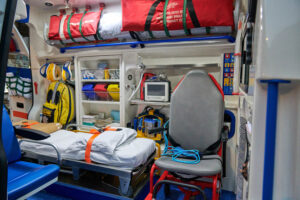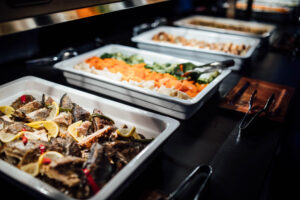
What’s Included in Oil and Gas Facilities Management
Oil and gas facilities management is a complex and critical discipline that ensures energy operations in Canada’s most remote locations

Remote facility chefs are the unsung heroes of Canada’s sprawling wilderness operations—from fly-in camps tucked into diamond-rich tundras to energy exploration sites in the northern forests. These culinary professionals don’t just cook; they create comfort, fuel productivity, and cultivate morale in some of the world’s most isolated environments. Their life is one of high stakes, high creativity, and high resilience.
Mornings start early—usually around 4:30 a.m. The camp is quiet except for generators humming and distant wildlife calls. The remote facility chef shuffles into the industrial kitchen, fires up the coffee machines, and prepares breakfast for dozens or even hundreds of workers. Every meal is carefully portioned based on a weekly food camp menu—approved ahead of time by remote camp management and tailored to nutrition and logistics.
After breakfast service, there’s barely a breath before diving into prep work for lunch and dinner. Unlike typical food catering services, supply runs here only happen weekly or biweekly, so there’s no room for error. Every ingredient has to be accounted for, especially when managing food for energy remote food catering services or oil food catering services, where appetite and output run high.
By evening, dinner brings not just sustenance but comfort: roast turkey and stuffing, hearty soups, and decadent desserts that remind workers of home. Cleanup can stretch late, and the chefs finally clock out around 9 p.m., only to do it all over again tomorrow.
It’s not just long hours and complex logistics—it’s the intense psychological toll of working in isolation. Remote facility chefs might be away from family for weeks, and the unpredictable weather, high-stress demands, and social solitude demand immense mental resilience.
Physically, the role is demanding too. Heavy lifting, constant standing, and high-pressure environments rival any construction job. Just like those in construction remote food catering services, chefs need to maintain stamina, manage stress, and adapt on-the-fly to missing ingredients or malfunctioning equipment.
To mitigate burnout and support staff wellness, companies implement strict health and safety policies for remote workers, which include mental health checks, proper sleep routines, and peer support programs—crucial lifelines when you’re running kitchen services at exploration remote food catering services or diamond mine food catering services.
Not every talented chef is cut out for camp life. Remote facility chefs must have more than culinary credentials—they need the right mindset. The most effective chefs in these roles often display a unique blend of attributes:
Being a chef in a remote facility food catering service means mastering both craft and compassion, combining culinary expertise with a deep understanding of human behavior and needs.
Each sector has its own quirks. In forestry food catering services, for instance, the challenge might be creating high-protein menus for lumber crews with limited power sources. Meanwhile, in oil food catering services, it’s about producing calorie-dense meals for workers in harsh, windy conditions.
Research food catering services demand precision and routine, often catering to scientists who have specific dietary restrictions. Energy remote food catering services, on the other hand, require flexible menus with consistent nutritional content to keep physical laborers at peak performance.
In particular, gold mine food catering services require hearty, high-energy meals for crews who work long shifts in isolated, rugged areas like the Yukon. Maintaining variety while delivering essential nutrition is key—not just for health, but for morale.
Remote site catering isn’t just about feeding people—it’s about adapting to fluctuating schedules, supply delays, and harsh terrain, whether you’re serving up camp food menu ideas at a small exploration site or providing large-scale meals for remote site chefs in expansive corporate operations
One of the most underrated skills in this role is planning the food camp menu. Chefs rely on spreadsheets, historical consumption data, and budget constraints to build menus weeks in advance. A remote catering operation might need to adjust based on weather delays, workforce changes, or kitchen shortages.
Imagine crafting meals for a fly-in crew at a diamond mine worksite—knowing they’ll only eat what was flown in last Tuesday. Or planning three weeks of meals for a construction camp without access to fresh herbs.
Menus must appeal to a wide palate, consider health requirements, and stay exciting. Chefs rotate classics like meatloaf, pasta night, and taco Tuesdays, but also surprise crews with themed dinners, vegetarian feasts, or spicy international flair. All while abiding by guidelines from remote facility food catering services.

Effective remote camp catering relies not only on cooking skills but also on seamless teamwork across departments. Chefs play a pivotal role in coordinating logistics, adapting menus, and maintaining safety standards in unpredictable environments.
Cross-Department Communication
Remote facility chefs constantly coordinate with operations teams, housekeeping, and health officers to ensure mealtimes align with shift schedules, dietary needs, and safety standards.
Procurement & Supply Chain Syncing
They work closely with logistics coordinators to track deliveries of bulk ingredients, specialty items, and cleaning supplies—vital for camps dependent on weekly or biweekly resupply flights or road shipments.
Menu Adaptation
As on-site representatives of camp catering companies, they adapt menus in real time—adjusting for inventory changes, delivery delays, and evolving site needs. When deliveries are delayed, they adjust quickly—crafting alternative meals that meet nutrition goals while keeping teams satisfied and fueled for the job.
Health & Safety Integration
Chefs contribute to the implementation of the health and safety policy for remote workers by maintaining hygienic kitchen environments, handling food safely, and ensuring waste disposal aligns with regulatory standards.
Feedback Loops for Continuous Improvement
They gather direct input from workers, supervisors, and remote camp management to fine-tune meals, improve satisfaction, and respond to changing dietary preferences or morale needs.
Emergency Planning & Contingency Cooking
Remote site chefs often plan for supply disruptions, power outages, or extreme weather by keeping reserve ingredients and “just-in-case” menu options.
Cultural & Seasonal Coordination
For multicultural crews, chefs often coordinate with HR or site leads to incorporate meals that honor cultural traditions or seasonal events—boosting inclusivity and team spirit
They nourish bodies, boost morale, and make inhospitable environments feel just a bit more like home. Their days are long, their challenges great, and their impact immeasurable. Whether serving in forestry camps or plating meals in icy northern research labs, these culinary professionals are more than cooks—they are caretakers of well-being in the wild. For those who wonder what it really takes, just know this: remote facility chefs bring heart, grit, and a whole lot of flavor to some of the toughest jobs on Earth.
Looking for experienced remote facility chefs or reliable remote catering solutions? Connect with the Domco Group today to learn how our tailored food catering services can support your team’s health, productivity, and morale—no matter how challenging your location is.
Groupe Domco Canada Limitée est l'un des fournisseurs de services en régions éloignées le plus fiable et le plus respecté au Canada. Entièrement canadien et propriété indépendante, Domco est en affaires depuis 1945. Nous proposons des solutions intégrées pour les régions éloignées, notamment un cycle de menus nutritifs et bien planifiés, l'établissement de relations à long terme et de racines profondes canadiennes dans des endroits éloignés avec des communautés autochtones.
Laissez-nous vous présenter quelques avantages clés qui nous distinguent.

Oil and gas facilities management is a complex and critical discipline that ensures energy operations in Canada’s most remote locations

In the rugged, often isolated world of remote construction camps, construction facility management is the invisible force that sustains daily

Remote maintenance is the backbone of operational continuity in Canadian work camps, especially those located in isolated regions supporting industries

Remote camp health and safety is a vital concern in the management of Canadian remote workforce camps, especially in resource-driven

Keeping crews energized and satisfied starts with smart camp food menu ideas—especially in remote environments where morale and nutrition go

Gas remote camp mobilization is a critical operational phase in Canada’s oil and gas industry, particularly in remote and northern

When it comes to remote site security in Canadian work camps, ensuring safety and protection is paramount. These facilities, often

In Canada’s vast and resource-rich landscapes, remote site maintenance plays a pivotal role in sustaining the operations of work camps

In Canada’s vast and often isolated regions, remote camp management plays a vital role in advancing sustainability across diverse work

Remote site administration is a vital function in Canada’s most geographically isolated and operationally demanding environments. From the Arctic’s frozen

Developing a sustainable infrastructure for a remote camp facility located in the rugged, often isolated regions of Canada—such as the

In Canada’s vast and rugged landscapes, remote facility catering has evolved from a logistical challenge into a platform for sustainable

Budgeting for facility repair and maintenance in remote Canadian work sites is no small task. When miles away from urban

The process of gas remote camp mobilization in Canada is a critical operation that supports the development and maintenance of

Remote facility chefs are the unsung heroes of Canada’s sprawling wilderness operations—from fly-in camps tucked into diamond-rich tundras to energy
